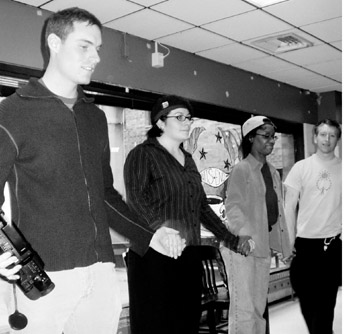On Wednesday, November 12 in the Wit’s End Café, the Alcohol and Addiction Resource Center hosted a free skit about the dangers or drug abuse by a group called “The Improbable Players.” The actors, all recovering alcoholics or ex-drug users, played four kids entering college. Two of them get into drug use quite heavily, leaving the other two who abstain to deal with their drugged-up friends. One of the clean students carries around a video recorder and makes a documentary of his friends’ trips (pun intended) through college.
The overall theme of the play is that drugs are bad for you. Much like an after school special, the characters come off incredibly trite; one of them is a struggling artist/actress who has low self-esteem and uses drugs as an escape because she is “so different from everyone else.” The friend making the documentary often hears about the drugs that are being used, looks them up online, and then describes them in phone conversations in a heavy handed attempt to educate the audience on the horrific dangers of drug use.
The plot devices are unsurprising; the starving artist character keeps a diary of her forays into drug use, taken straight from the pages of Go Ask Alice. One can tell that the actors feel strongly about their work because the subject hits very close to home, but their execution was lacking. When one character hears that another has sought help with her abuse problem, he responds by saying, “She went to rehab? What a geek!” C’mon. We’re all adults here. Treat us as such.
After the play, the actors sat down for a question-and-answer session with the audience. Here was the real meat of the experience came. Audience questions ranged from how to deal with loved ones in similar situations to the proper timing and effectiveness of an intervention. “Interventions are best done when the person is hung-over. That way, they are more inclined to listen because they are actively feeling the thing you are describing,” said Chris Everett, when asked about the effectiveness of interventions. “One of the most difficult things to deal with was letting go of the bonds, the friends that you did drugs with. Little by little, I had to make new friends that weren’t users,” said Kari-Anne Kulag, in response to a query concerning the loneliness of recovery.
Chris Everett, 36 and a “sober alcoholic,” started drinking at age 12 at a slumber party. She was dealing with self-esteem issues and played one of the clean friends. Her character was a support for the starving artist and served as an example of what a life without drugs can produce: a college education and a bright future.
Brian Jansen is 27, also a recovering alcoholic. Brian started at the tender age of 11. His character was the documentarian, following his friends, interviewing them, and recording their descent.
Kari-Anne Kulag, 27, started using many different drugs, “everything I could get my hands on,” in high school. Her character was the starving artist who dropped out of college to move to New York to make it in the big time.
Chris Manschreck, 23, started drinking at 11, dropped out of high school and college, and spent 9 months in jail before finally cleaning up. He played a drug dealer who sold ecstasy outside of clubs.





















































